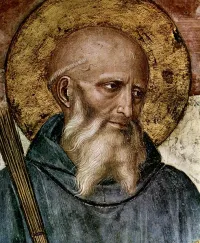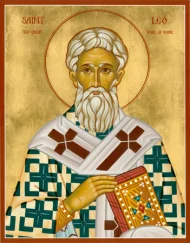 Polyelaios – the main chandelier in the Nave of the Church [translator’s note].
Polyelaios – the main chandelier in the Nave of the Church [translator’s note].
I am not able, here, to pass over in silence the beautiful and fitting analogy put forth by some concerning the renewal of the whole of creation.
They compare it to a wise artist who is fabricating a great, wondrous, and costly polyelaios and who does not finish it in one sitting, but rather works on it for a great deal of time, now working on one small section of the polyelaios, now on another; and sometimes he fashions the middle bars of the polyelaios, and sometimes its oil lamps, sometimes its bulb, and sometimes he works on the parts that will hold the candles.
Once he has finished the entire polyelaios and all of the small and large parts it comprises, then he exhibts this wondrous polyelaios in the center of the market, with all of its numerous parts connected; and, seeing that it was made according to his design, beautifully and most skilfully, he rejoices greatly and is glad.
But all of the people, also, seeing it shining most brightly and fitted together with most wondrous skill, are enraptured and praise the artist who has fashioned it, calling out: “Well done! Well done!”
In the same way, God, the all-wise master craftsman and architect, in his desire to fabricate this greatest, most wondrous, and nearly infinitely-sized polyelaios of the entire universe, did not complete it at once, because the parts making up this great polyelaios are not only inanimate and irrational, but also rational and possessors of free will. For this reason, He has been working on these parts of the world for 7,311 years now, and we do not yet know how many more years He will work on it until the end of time.
Now He fashions and finishes one part of the polyelaios, now another; that is, now He seizes one soul that has been kept pure by the practicing of the commandments, and now He seizes another that has been justified through repentance; and another He saves through His promises, while another by His threats; this person He delivers from sin through trial and chastisement, and that one He frees from the Devil by His Grace, until He has assembled all of the small and great parts of which this most wondrous Polyelaios of the world is to be comprised.
When these things have been completed and the heavens, the luminaries, the stars, the elements, the earth, and the bodies of the righteous have been renewed through the regeneration and resurrection, and through alteration and amendment, then God, the master craftsman, will fabricate His great polyelaios and equip it with all of its most exquisitely beautiful, resplendent, and most wondrous parts.
Nicodemus the Hagiorite (1749-1809): The Greatest and Most Wondrous Polyelaios in the Entire Universe and the Renewal of the Whole of Creation (Commentary by St. Nicodemos on II St. Peter 3:13) @ Old Calendar Orthodox Church of Greece.












